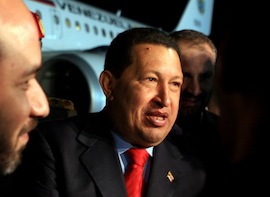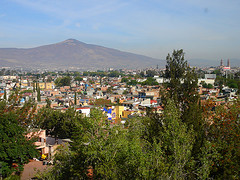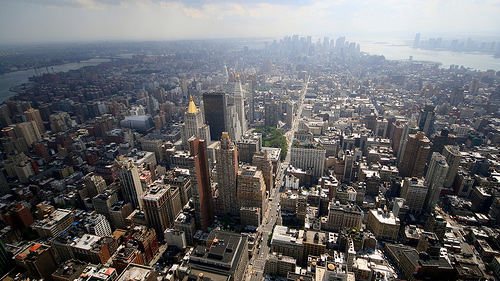
Brazil, Dispatches, United States
Wikileaks Cables Portray A Different Side Of Brazil’s Lula da Silva
December 15, 2010 By Nikolas Kozloff
Big Power Projection and the Amazon
What will be the role of the Brazilian military in future? Sobel’s analysis suggests that the South American juggernaut will act to defend its strategic and economic interests. Take the Brazilian Navy, for instance, which will defend the country’s burgeoning offshore oil facilities. According to Sobel, there was no threat to Brazil’s oil deposits, but the media and political leaders hyped the issue in an effort to enhance the national security state. In this sense, the power elite in Brazil differ little from their U.S. counterparts who employ similar arguments.
The Brazilian Navy also seeks to increase its presence along riverways. Such policies are reminiscent of the days of the military dictatorship, when the armed forces placed great emphasis on developing the Amazon basin, to the detriment of the environment. In his report, Sobel comments that Lula’s strategic plan for the Amazon “indulges in the traditional Brazilian paranoia concerning the activities of non-governmental organizations and other shadowy foreign forces that are popularly perceived as potential threats to Brazil’s sovereignty.” Sobel assigned a cynical backroom motive to Lula’s plans: “The political preoccupation with imagined threats to sovereignty in the Amazon…serves the practical purpose of tasking the military with developing greater capabilities to project power into the region most likely to be affected by instability in neighboring countries.”
Hoping to join the ranks of the world’s most prominent military players, Brazil seeks to acquire nuclear powered submarines and aircraft carriers. Other priorities include satellite capability, particularly through a space launch, and cybernetics. The entire strategy is designed to promote Brazilian “independence;” that is, the ability to “project its military power as it wishes, able to produce its own military hardware and able to control strategic economic sectors.” Though the Lula strategy allows for “strategic partners,” outside countries should be willing to transfer key technologies to Brazil so as to contribute to the country’s overall independence. Having built up its own endogenous arms industry, Brazil will then seek to export its weapons throughout the wider region.
Geopolitical Significance of Brazil’s Rise
The Wikileaks documents suggest that the United States does not view Brazil’s rise on the world stage with too much alarm. Indeed, according to Sobel “A Brazilian military that is more capable and deployable can support U.S. interests by exporting stability in Latin America and be available for peacekeeping elsewhere.” Wikileaks documents do suggest that Sobel’s cynical view may not be so far off base: though Lula and his political coalition came up through the ranks of organized labor, they are certainly not redefining the leftist agenda throughout the hemisphere. To the contrary, Wikileaks cables show the PT and Lula circle as a rather unscrupulous bunch, obsessed with promoting Brazil’s public image and placating the U.S. on most issues that matter.
Brazil’s rise, then, poses no ideological challenge to the U.S. In the very long-term, however, Brazil may see itself as a rival military hegemon in the wider neighborhood. Already, Wikileaks documents suggest a fair amount of tension over the issue of military technology. Though the chiefs of the Brazilian armed services saw military cooperation with the U.S. as “excellent,” they complained about U.S. export licenses.
The officers griped that the State Department’s policy of delaying such licenses was “aimed at restricting Brazil’s access to military technology,” and had created “problems at the political level.” Speaking with the U.S. ambassador, Lula smarted over U.S. handling of the Super Tucano fighter plane imbroglio. “Brazil,” Lula said, “needs the tools to deal with its neighbors…Brazil can’t afford the type of embarrassment caused by not being able to sell Super Tucanos to Venezuela.”
For now, the United States and Brazil are friendly allies. But at a certain point in future, Brazil might figure it’s had enough of Washington in the wider region and start to challenge the U.S. in a more overt manner. Not, it seems, by encouraging the spread of progressive ideas but rather by throwing its military and geopolitical muscle around so that Brazil, and not the U.S., is the main cop on the beat.
Image: World Economic Forum @ Flickr.
Nikolas Kozloff is the author of Revolution! South America and the Rise of the New Left (Palgrave, 2008) and No Rain in the Amazon: How South America’s Climate Change Affects the Entire Planet (Palgrave, 2010). Visit his website, www.nikolaskozloff.com
About Nikolas Kozloff
Nikolas Kozloff is a New York-based writer specializing in political and environmental topics. A former academic, he received his doctorate in Latin American history from Oxford University in 2002. Prior to writing his first book, he worked as a Senior Research Fellow at the Washington, D.C.-based Council on Hemispheric Affairs, where he conducted research papers on Venezuela. He has provided political analysis on Latin America for such media outlets as BBC, WNYC's Brian Lehrer, C-SPAN Washington Journal, and even put in a guest appearance on the Daily Show with Jon Stewart. Though he writes frequently on Latin America for such online publications as the Huffington Post, in more recent years he has focused increasingly on environmental topics.
< Previous Article

December 15, 2010 > Staff
Chávez Asks Venezuela National Assembly For Decree Powers
Next Article >





5 Comments
[…] https://latindispatch.com/2010/12/15/wikileaks-cables-portray-a-different-side-of-brazils-lula/ […]
[…] Wikileaks cables reveal a different side of Brazil’s Lula da Silva, Latin America News Dispatch […]
That Wikileaks is a very sophisticated and elaborate subterfuge for disinformation.
The goal of that potpourri of good and and false information is to divided and conquer. Caveat emptor– Let the buyer beware.
I understand that by including the rest of Latin America in this article things just get way too complicated, but without Mexico, Argentina or even Spain it’s hard to see Brazil being the “main cop on the beat.” Brazil is in many ways a similar position to China, a poor but developing country which is only just now starting to manage overwhelming internal problems. Brazil has a very long way to go before projecting its power in South America. I can see a plurality of Brazilian interests trying to influence UNASUR in the future- a la Germany, but I don’t see Brazilians interested in US style regional hegemony.
This is a well researched article. Great job. A lot of the revelations we suspected already (the pragmatiism, the desire not to aly Brazil with the hard left, the lack of real conflict between Brazil’s rise and US interest), but it’s interesting to get this inside view.
Comments are closed.